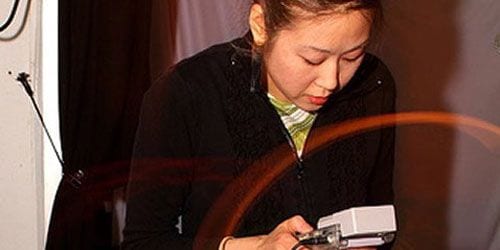
As a distant fan of 8bitpeoples, the loose New York musical collective and reigning kings of chiptune, the most surreal thing about attending their annual blowout festival was that there was once a time when I had hoped to end up on the other side of the curtain. A few years ago, I cashed in a tremendous amount of accumulated vacation time all at once on top of my existing winter holiday and set out for Gotham with every intention of compiling my debut record as a composer while wandering the city’s vast network of subways, coffee shops, and other places to park my ass. No laptop, no scoring pad — instead, in my chest pocket was a Game Boy Micro loaded with a special cartridge called Nanoloop, a short-run homebrew special-order from Germany which allows synthesizers to be programmed and scripted into brief assemblages of beep that can then be saved and recalled, synchronized with a computer, and even digitally transferred using sophisticated multitracking capabilities. Conceptually, the point was to break myself out of studiothink and funnel my years of music theory classes through the smallest technological mold possible — bitcrusher bebop, for lack of a better term. It didn’t work out. It only took me three coffee shops to realize that Nanoloop’s sequencer just wasn’t advanced enough to hold the type of music theory I wanted to throw at it. Chords couldn’t exist unless you programmed the notes across several instruments, for one, and long-form songs could only be written by stringing together repetitive loops that wouldn’t let you edit the individual notes they contained. I bailed; either the yin or the yang had just gone out the window, and if it wasn’t going to be about the intersection of minimum technology and maximum pitch theory, I no longer saw the point. So that’s my story as a half-assed eight-bit person. Whatever their own analogous artistic crises may have consisted of, then, I’m impressed that the Blip artists pressed on to make their tunes actually come to fruition — I’ve fiddled with the programming enough to know that this stuff doesn’t come easily. There’s a certain sameness to a lot of it on the surface — all lo-fi electronic music in 4/4 with house-derived “drum” sequences which rely on filtered white noise — but after taking in a couple of sets, the differences between the artists become more readily apparent. Bucket-headed spaz-dancer Sulumi’s restless melodies were a fantastic highlight, skipping across the room like so many chips of shale across a Mario 2-2 swimming level, but geek-chic Asian chick Bubblyfish had the most depth, with an enthralling opener which expertly transitioned from jovial Katamari plinks to ominous Metroid gloom over the course of ten minutes. Diminutive composer Cow’P took the stage in a red shirt that had the word “Discoteca” scrawled across the front in angular ‘80s era screen-print lettering. Indeed. I wouldn’t even remotely identify myself as a video game enthusiast at this point, and my personal interest in chiptune systems was more musical and philosophical than nostalgic or scenester, but there are latent memories of the games of the late ‘80s and early ‘90s in a lot of people from my generation. A few months back, a friend of mine just about fell out of his chair when I played him Koji Kondo’s iconic stage-select music from Mario 3, and I still listen to the Street Fighter II tunes by Alfh Lyra which I salvaged from a Genesis cartridge a while ago back with embarrassing frequency. That part of the brain gets indulged gratuitously at a chiptune show thanks to the stage projections, which usually consist of nerd-humor and graphics derived from the games we played as kids and then forgot: Dr. Mario, Rampage, Bad Dudes, Paperboy, and Sonic Spinball. I got dizzy when the opening titles from the original Prince Of Persia flashed up on the screen; I sank countless hours into that one when I was 10 and had since managed to block it out entirely. I took in an unreasonably large portion of Bubblyfish’s set from outside in the lobby, where I was checking out the coolest merch table I’ve seen in years: CDs, vinyl, and shirts next to circuit-bent keyboards, LED visualizer kits, basement-workbench samplers, and of course the requisite Gameboy synth cartridges. I spent the most time with a demo of Little Sound DJ, a competitor to Nanoloop which includes a few more sophisticated programming options, but in the end I learned from reading the user manual that its sequencer still won’t do what I want. Maybe I’ll jump ship anyway just for the hell of it, but if not, I still have Nanoloop waiting for me in a drawer at home. Perhaps that’s not such a problem after all; Sulumi is a Nanoloop guy, and he floored me. Blipfest remains unique among my concert experiences because I went home with the knowledge that I already had all the tools necessary to do what I had just seen on stage, and what’s more, they could fit in my pocket and travel around with me through the rest of my life, popping up as a musical sketchpad on the subway or in a dentist’s waiting room. That, my friends, is a ridiculously inspiring feeling. Even so, along with a custom-modded Game Boy with a glowing red screen backlight, Little Sound DJ was still calling my name from that merch table at the end of the night as I disappeared into the first snowfall of the season. Not tonight, guys, but there’s always eBay. See you next year, one way or another.

![Call for Papers: All Things Reconsidered [MUSIC] May-August 2024](https://www.popmatters.com/wp-content/uploads/2024/04/all-things-reconsidered-call-music-may-2024-720x380.jpg)



